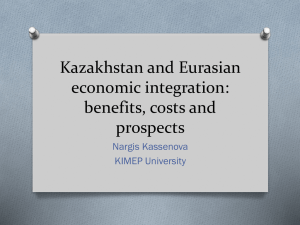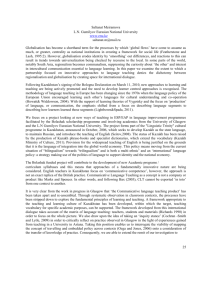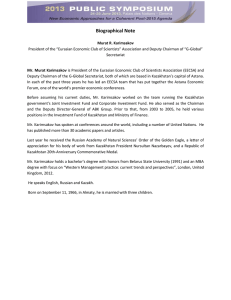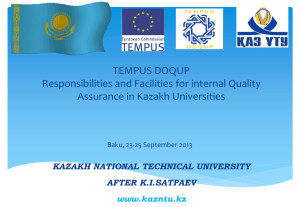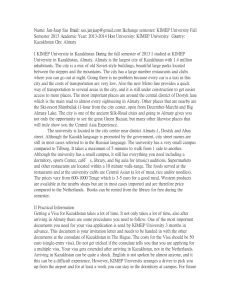GUIDELINES FOR WRITING THE EXPERIENCE REPORT “Experiences” from partner universities)
advertisement
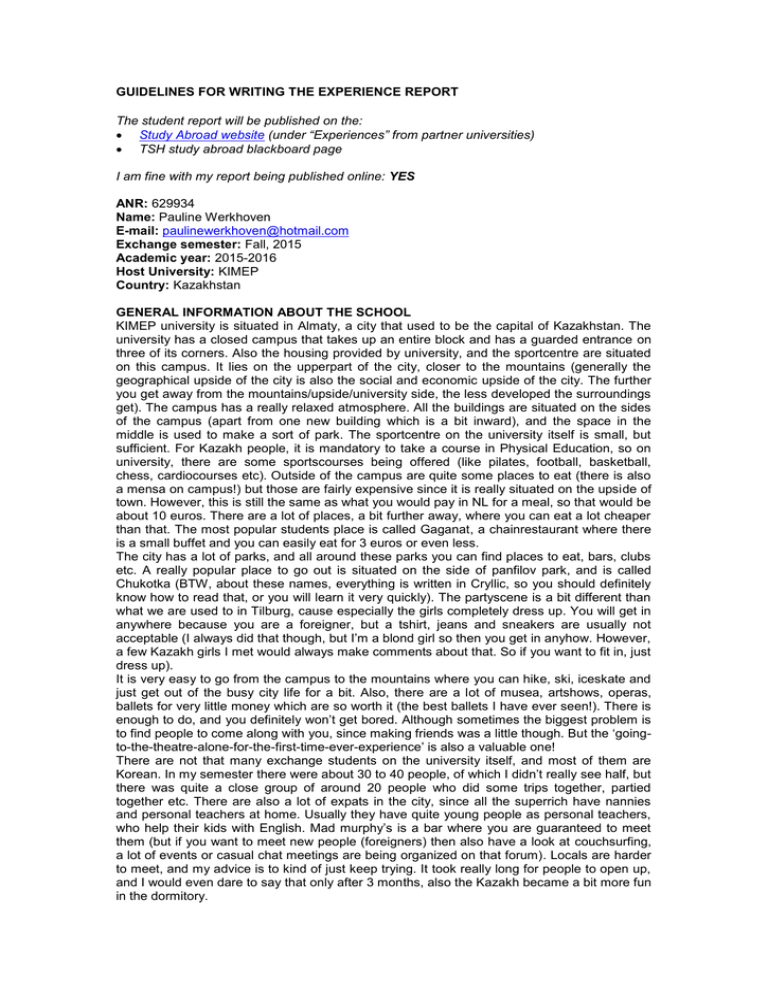
GUIDELINES FOR WRITING THE EXPERIENCE REPORT The student report will be published on the: Study Abroad website (under “Experiences” from partner universities) TSH study abroad blackboard page I am fine with my report being published online: YES ANR: 629934 Name: Pauline Werkhoven E-mail: paulinewerkhoven@hotmail.com Exchange semester: Fall, 2015 Academic year: 2015-2016 Host University: KIMEP Country: Kazakhstan GENERAL INFORMATION ABOUT THE SCHOOL KIMEP university is situated in Almaty, a city that used to be the capital of Kazakhstan. The university has a closed campus that takes up an entire block and has a guarded entrance on three of its corners. Also the housing provided by university, and the sportcentre are situated on this campus. It lies on the upperpart of the city, closer to the mountains (generally the geographical upside of the city is also the social and economic upside of the city. The further you get away from the mountains/upside/university side, the less developed the surroundings get). The campus has a really relaxed atmosphere. All the buildings are situated on the sides of the campus (apart from one new building which is a bit inward), and the space in the middle is used to make a sort of park. The sportcentre on the university itself is small, but sufficient. For Kazakh people, it is mandatory to take a course in Physical Education, so on university, there are some sportscourses being offered (like pilates, football, basketball, chess, cardiocourses etc). Outside of the campus are quite some places to eat (there is also a mensa on campus!) but those are fairly expensive since it is really situated on the upside of town. However, this is still the same as what you would pay in NL for a meal, so that would be about 10 euros. There are a lot of places, a bit further away, where you can eat a lot cheaper than that. The most popular students place is called Gaganat, a chainrestaurant where there is a small buffet and you can easily eat for 3 euros or even less. The city has a lot of parks, and all around these parks you can find places to eat, bars, clubs etc. A really popular place to go out is situated on the side of panfilov park, and is called Chukotka (BTW, about these names, everything is written in Cryllic, so you should definitely know how to read that, or you will learn it very quickly). The partyscene is a bit different than what we are used to in Tilburg, cause especially the girls completely dress up. You will get in anywhere because you are a foreigner, but a tshirt, jeans and sneakers are usually not acceptable (I always did that though, but I’m a blond girl so then you get in anyhow. However, a few Kazakh girls I met would always make comments about that. So if you want to fit in, just dress up). It is very easy to go from the campus to the mountains where you can hike, ski, iceskate and just get out of the busy city life for a bit. Also, there are a lot of musea, artshows, operas, ballets for very little money which are so worth it (the best ballets I have ever seen!). There is enough to do, and you definitely won’t get bored. Although sometimes the biggest problem is to find people to come along with you, since making friends was a little though. But the ‘goingto-the-theatre-alone-for-the-first-time-ever-experience’ is also a valuable one! There are not that many exchange students on the university itself, and most of them are Korean. In my semester there were about 30 to 40 people, of which I didn’t really see half, but there was quite a close group of around 20 people who did some trips together, partied together etc. There are also a lot of expats in the city, since all the superrich have nannies and personal teachers at home. Usually they have quite young people as personal teachers, who help their kids with English. Mad murphy’s is a bar where you are guaranteed to meet them (but if you want to meet new people (foreigners) then also have a look at couchsurfing, a lot of events or casual chat meetings are being organized on that forum). Locals are harder to meet, and my advice is to kind of just keep trying. It took really long for people to open up, and I would even dare to say that only after 3 months, also the Kazakh became a bit more fun in the dormitory. PRACTICAL INFORMATION The pre-arrival information is exactly what you would stereotypically expect from Kazakhstan. They send you a lot of information booklets and stuff, but just don’t try to ask any questions about them. I send multiple emails about housing for example, but answering questions was done by referring to the booklet I was asking about again. So not very usefull. But this is also partly cause the Kazakh have a great sense of solving problems last minute. So to continue on the example of housing; A lot of people didn’t have anywhere to live, but after a week suddenly everybody had a room/house, or whatever they preferred. Planning in advance is not their strongest quality, but that actually never caused any issues since they solve it so well. In hindsight, I can say I should have been a lot less stressed about arriving. True that I didn’t really know anything, but everything worked out. I got myself a visa through an assisting agency, mainly because I was travelling before and I needed to get it done quickly. I believe it costs around 270 euros, which is quite a lot but you can also access the country multiple times. Almaty is quite close to the border of Kyrgystan so you definitely need a multiple access visa so you can travel around a bit. It was possible to be picked up from the airport, but as I said, I was travelling and came eventually by bus across the Kyrgyz border so I didn’t make use of any of those arrangements. There is a buddy system, where every exchange student gets a local buddy. This would theoretically work very well, but in my semester there were a lot of buddies that just did it for their CV and we would actually never see them around. Some of them that were around were absolutely amazing though! They would organize small trips for exchange students (also for those that were not their own buddies) and we were invited over a few times for a real Kazakh meal with their families. I felt like I got closest to the Kazakh culture, with the help of these buddies. There is not really an introduction week, just one day where they helped you a bit. When arriving in Kazakhstan you need to do some medical checks (HIV test, chest scan etc.) and on the introduction day, our buddies dragged us all over town to get all that done. It wasn’t really a social event. I stayed in the university dormitory which was to be honest, terrible and fun at the same time. Arriving was very chaotic so I had to move 3 times in the first week since they double booked some rooms. You share a fairly small room with another exchange student. In this room you both have a one person bed (seriously though, make sure you get a proper new one. They have a few actual matresses but if you don’t demand those on the first day you will be screwed for the rest of the semester. I was too polite in the beginning, which resulted in me sleeping on a wooden board, with a garden cushion of around 3 cm on it, which even in the 3cm managed to be bumpy). It may seem really rude to be so direct, or to just say that you want something better, but if you don’t point it out they will not change anything and there are simply not enough proper materials for every room. Next to your room is another room just like yours, with two Kazakhs. Together you share a toilet and a bathroom which were cleaned every day. This system is repeated all across the hallway, and you have around 18 rooms in a hallway (so 72 students!) with whom you share 3 kitchens and 2 laundry rooms. They have 4 washing machines per room, which work really well, but no dryers. So housing isn’t that great, but you pay (depending on the currency) around 100 euros per month for it. There are also people renting a house together, with which university will assist you but then you will pay around 400. The advantage of the actual houses is that they are furnitured, so you don’t need to buy that much. The university dormitory kitchen for example is completely empty so you still need to buy your own pots and pans. Life is generally cheaper than in the Netherlands. Especially for services like haircuts, or massages you pay almost nothing. Im not the kind of person who would in the Netherlands be into those things, but there it was actually nice to feel a little fancy with a massage or a pedicure and only spend 10 euros. You can stop almost any car to be a taxi, and if they happen to go in the direction you are going you can go with them for the equivalent of an euro (really handy after partying!). Also travelling around the country is cheap if you plan it yourself. I took a few nightbusses, and trains when travelling around which is totally safe, cheap and a lot of fun, so I would definitely recommend you doing that. It may sounds like the kind of country where a foreinger cant really do that, but hospitality is a really big part of their culture. Usually people where so enthusiastic that I was there to see their country (and completely surprised that someone from Europe would want to see it) that they proudly show you around and make sure you are getting where you want to go, and everything is okay for you. The first week of the semester is a week where you can add and drop your courses. So basically you can just check out the course and see if you like it and whether or not it fits in your schedule. Its fairly hard to get your schedule before, so it is difficult to communicate it correctly to Tilburg. TU wants you to confirm your courses before you will actually know what you can choose from, and there will be changes in the beginning of the semester. So actually it was Tilburg causing a bit of stress there, because their deadlines don’t match the KIMEP deadlines. However, I missed Tilburg deadlines sometimes, simply cause I had no clue yet, but they seemed to be fine with it. Which makes sense cause it was simply the best I could do, but it is nice to know in advance. Just do your thing, follow the KIMEP program, and don’t worry too much in advance. Things just sort themselves out last minute in that country, and trying to make it happen earlier is ineffective and just stressfull for you. Every course has two or three lectures per week, and you will get homework for all your classes (like; summarise these chapters). This made it actually very intense! Although the level of education isn’t that high, it was still really difficult. And actually it was really high in a way, just very different than what we are used to. It concerned more learning and less interpretation. So in some courses I learned more than what I would have done in the Dutch equivalent, and in others less. There is officially mandatory attendance to all your courses, and you can only miss 3 lectures per semester, but it is dependent on your teachers. Most of them appreciate it that you want to see more of Kazakhstan, so being honest and saying you are travelling was usually the best approach. Also in the exam period, they were willing to move some exams. I didn’t have the problem, but a friend had her last exam more than a week later than the previous ones, but her teacher just moved it, so she could go home earlier. There are a few special events where you get a day of. On a day like that, just cling to a Kazakh, and let them show you around (there is for example an apple-festival, which you should really visit in the first presidents park!) Ofcourse, you should be prepared for some cultural changes. To be honest, I really started appreciating Dutch culture more after my time there. In Kazakhstan, there is a huge difference between the rich and the poor, also in how they approach you. KIMEP is a really expensive university, and a lot of its students will be dropped by their driver in a fancy car every morning. Also girls have a lot of brand clothes, and my style was quite often frowned upon. I travelled before so I only had a backpack of stuff, which was mostly practical, and that was pointed out multiple times ( as in; you are a girl, why don’t you try to look nice). Girls are really expected to dress up all the time, and guys are expected to pay and be chivalrous everywhere. Most doors were opened for me, my groceries where carried up the stairs by any guy (also the 17 year old first year who is not flirting on wanting something from you or whatever, its just that that’s what he is supposed to do). In KIMEP, I must confess people weren’t that friendly towards foreigners. They simply didn’t care. However, if you travel around, or go hiking, all the Kazakhs you meet there will be the most friendly people you can imagine. I never felt so welcome in a country when travelling. People will do everything to try to understand your lacking Russian speaking skills, will drive you somewhere if you are lost, will share their food (homemade (!!! Very important, they always mention that its homemade by their wife/mother/sister/cousin a 1000 times) with you on trains or busses. Also on the streets at night, I felt totally safe. Yes it is a country with a lot of Russian influences, so yes, they drink a lot of Vodka. But not ever have i met a drunk guy who tried to talk to me or whatever (which in the Netherlands would definitely happen!). And one time a drunk guy did talk, he was immediately held of by random other guys. This protective culture is very strong, and men see it as their responsibility to make the streets safe. Some guys with nothing to do on an evening would just sit outside, keeping an eye on whats happening and making sure everything is okay. They are very proud of their country, so making sure you are comfortable, and the streets are safe are sort of a communal responsibility, in which everybody is contributing. Sometimes, they are also proud to the extent of irrationality. The culture is very closed, and people are not that capable to think outside of the box. If you tell them something they didn’t know, and they don’t like it, they will just completely ignore it. This mostly happened in the class rooms where they tried to have class discussion (most teachers are not from Kazakhstan, and will try to make you as a foreigner speak as much as possible). An example is that a student would be completely convinced Kazakhstan is one if the countries with most freedom of speech, pointing out it is number 170 out of 180 (whatever something like that), would just result in an ‘oh’ and a drop of the topic. So that was fairly annoying after a longer time, and that is what made me appreciate the Dutch culture more, since you can actually talk to people and make them change their mind (or they have an argument that makes you change your mind!) but that wouldn’t happen there. Also it is really difficult to get beyond to hospitality. Rich people in KIMEP don’t really bother with foreigners, and people you meet on the road are almost too polite. You don’t get beyond the feeling of being a guest, so although I really wanted to, I didn’t make any local friends there. But there are definitely a lot of things to learn in that country what we from Europe should take some note of. The kindness to strangers is really undescribable. It made me even feel uncomfortable in the beginning cause our first reaction is “why would this person do this for me, what does he want from me”, and it took months to actually get used to the answer to that question which is “nothing”. People really don’t want anything from you, and paying them back for their food or whatever is not appreciated. They love to give, and don’t want you to give anything back. I also travelled through Turkemenistan, Uzbekistan, and Kyrgystan and the culture there was exactly the same (it was only missing the superrich rude upperclass that Kazakhstan does have, so I liked that culture even better). Travelling around is definitely recommend, but you should be capable of having a few Russian basics for that (at least read the alphabet!). But basics can be very very basic, they try to really understand you so if you just say one word in Russian, they will keep on guessing and trying to come up with what you want until they find it. The local languages, Kazakh, Uzbek etc. resemble Turkish and also look a lot like each other, but are not spoken as much as Russian. The young generation speak English quite well, or they will find someone who does. ACADEMIC INFORMATION All courses are given in English, apart from the PE ones. It is not mandatory for exchange students to take any of these courses but definitely recommendable! Dragging your ass to the gym 3 times per week is never a bad thing, and it really helped my Russian speaking skills (I followed Chess and Pilates and would recommend them both. Pilates cause your back will hurt from the dormitory beds, and Chess because it is such a central Asian thing, with this big Russian guy explaining it, which was an amazing experience!) The workload is very very high compared to tilburg, but you don’t learn that much more. You will be wasting a lot of time on useless assignments like summaries, so you spend more time studying than you are used to. But I was never scared of failing a course either, so it is a bit easier than in Tilburg but that differs a lot per course. The first year courses are fairly simple, but the 3rd year courses can actually be a challenge. Exams are really straightforward, and concern a bit more about facts than about interpretation of those facts (i.e. your opinion on something wont be asked). They actually don’t really have the year system like we do so it is hard to determine what is first year or 3rd year or whatever. Some courses just have prerequitsites, and others don’t but Kazkah students can completely determin what they do when. Their first year is set with courses like academic English, statisticse etc. but the other 3 years can be filled in however they desire. All exams are written and you get 6 ECTs for every course. Prerequisites are more recommendations than a hard rule. Courses I took and what I think is relevant to know about them: - Theory of international relations. One of the harder courses I had! The teacher is Kazakh, but surprisingy feministic which resulted in some interesting conversations. - Introduction to international journalism. First year course and I legitely learned nothing here but got a 10. - Law of energy and natural resource. Form of contract law, 3 rd year, which was very factual (the teacher was just talking and you had to write down every word he said, no slides) but very interesting and I learned a lot! - Terrorism and security. Very interesting course given by a grumpy old American guy. Favorite course I had, which was a perfect balance of factual knowledge but also interpretation (resembled mostly the courses of tilburg). - Beginning Russian. Really starts from the beginning onwards, with the alphabet and stuff, and then catapults superquickly into the grammar. So in the beginning I laid back too much cause it was too easy, and later I couldn’t keep up anymore. Definitely recommendable, just make sure you are still attentive after 10 lectures and don’t make my mistake. - PE: Chess and pilates. Yessss you have to do a PE course! Lots of Kazakh and speaking Russian and it was a lot of fun (ofcourse you don’t get the credits to Tilburg but you actually also take written exams in chess for example, and if was definitely worth the time) PERSONAL DEVELOPMENT I think I personally overestimated how well I would fit in and feel at home in another country. I had been abroad to Peru for five months before, and I felt so quickly at home there, that I kind of expected that to happen again. In Peru it also took more than a month, but then I felt comfortable. In Kazakhstan, I was so convinced I would have that same sense again, but it never really came. I think in the first few months, I was trying really hard to fit in, but after a month or 3, I just gave up on it, and was just looking forward to go home. If I look back on it, I probably shouldn’t have stressed as much in advance because at the end I was just tired of it all. If you are a bit more relaxed I think you could fit better in this country, but I wanted to be in control and that didn’t work. Maybe it would have also been worth it to invest in renting a house with some other students, because sharing a 12 square metre room with another person is also very exhausting after a while. I’m proud of myself that I went there, and that I stayed the entire time, but for me it is not something I would quickly do again. But I learned so much from it! I think I did really grow as a person (although im also still a bit recharging from it) and I saw the most amazing, breathtaking things. The nature is amazing, so close to the mountains and the steppes. The steppes are more widespread than you can imagine, and you can drive around for days, not seeing anyone but hurdes of wilde horses running around. The cities in Uzbekistan are the prettiest I have ever seen, and the pilgramige I tagged along on in the West of Kazakhstan taught me so much about other religions. I learned a lot about other religions, and cultures and how they can sometimes just perfectly merge toghether. It is a muslim country, with a bit of Russian vodka drinking and culture in it, and some roots to its own culture with family trees and respecting nature and horses. And these three different cultures/religions, where just merged per person, and everybody was okay with whatever everybody else was thinking. As the first girl ever, I was allowed into Russian orthodox church, I was converted to Islam by a clerk in the underground mosques, I was offered traditional horsemeat by a Kazakh family that believed that the happiness of their guest determined how lucky their lives would be, and I was invited to a Russian birthday party in a Jurte with loads of vodka and grilled meat who made me their honored guest. In those moments I have learned more about accepting another person/culture/religion than I have ever done before. It is different to learn about cultures than to actually experience them. And the Kazakh are very willing to take your hand and drag you into their culture and show you all of it. I would definitely recommend everybody to go there. Most people should just go there for travelling, which is already mind-blowing and a very usefull experience. But if you are up for it, and prepare for the struggle, cause it is not going to be easy, this may really be the place for you. I was just so tired that coming home was the most amazing feeling in the world (I actually cried my first morning at home, when I woke up for the first time in months not out of backpain, cold, a roommate or whatever, but was still comfortable in a nice bed). In the few months when returning, I didn’t appreciate my stay in Kazakhstan that much, and sometimes wished I had just gone to an easy place in Spain or wherever, but now that I am home longer, and have some energy again, I realise how much I have grown there, and Im sure that in 10 years time, I might look back on that time as the most important period of my life, and definitely something to be proud of. Not everybody goes to a country like Kazakhstan, so it is okay if it is sometimes a bit hard, but it was worth it.
